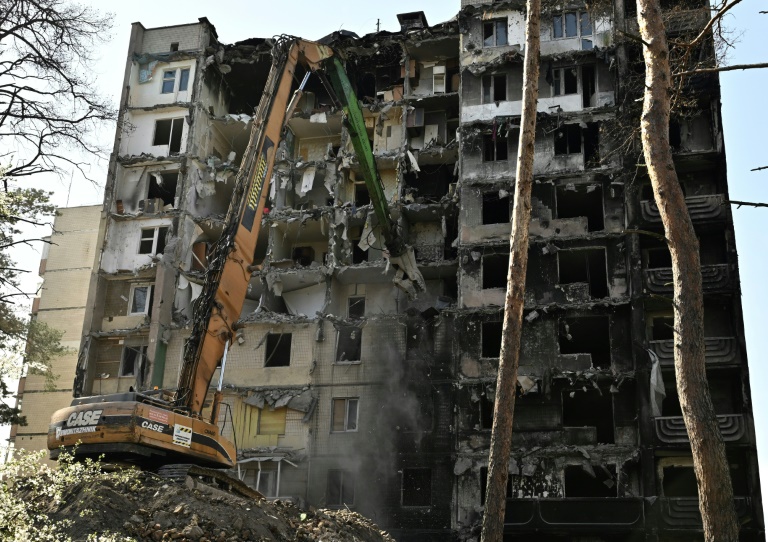Bart Gruyaert had ambitious intentions when he agreed to assist in the reconstruction of apartment blocks around Kyiv, driven by a hope to play a role in Ukraine’s broad recovery program post-Russian invasion. Gruyaert works for Neo-Eco, a French company that aimed to contribute to the rebuilding effort with a secured fund of 20 million euros. However, the local military administration in Gostomel posed unexpected challenges by demanding that Neo-Eco transfer the project’s funds to its bank account, claiming it would manage the project more effectively. This demand not only contradicted standard procedural expectations but also highlighted the prevalent corruption issues that have consistently plagued Ukraine since its independence in 1991. Gruyaert’s refusal to comply with this request led to significant delays and added complications, effectively halting progress on the project.
As Neo-Eco’s efforts progressed toward a standstill, the situation around the Gostomel military administration escalated, leading to a discovery of embezzlement activities. This culminated in Ukrainian investigators uncovering claims of misappropriation involving around 21 million hryvnias, approximately $470,000, that were allocated for reconstruction. The head of the local military administration, Sergiy Borysiuk, was dismissed after the allegations surfaced. Preceding his removal, Borysiuk bizarrely held a press conference claiming to have done all he could for the reconstruction efforts and suggested that blame should not be directed at him. His statements were indicative of a deflection of accountability that exacerbated the entrenched issues surrounding corruption in the region.
The case in Gostomel is not unique; it reflects a broader systemic problem of corruption that continues to impede Ukraine’s progress. In the past decade, despite steps taken towards anti-corruption reforms aimed at meeting European Union criteria, Ukraine remains severely affected by corruption scandals, as shown by its ranking in Transparency International’s corruption perceptions index, which has shown minor improvement but still places Ukraine at 104 out of 180 countries. Meanwhile, the ongoing war against Russia has paradoxically opened avenues for personal enrichment among certain officials, generating high-profile corruption cases related to embezzlement of reconstruction funds. Public sector officials have been arrested for fraudulent activities, including selling exemptions from military service, casting a shadow over the country’s fiscal integrity, particularly as it heavily relies on Western financial support.
Despite the adverse experiences faced by Gruyaert and Neo-Eco, there is a gambit of optimism within Ukraine regarding its capability to combat corruption. While previous decades remained unyielding to the notion of holding senior officials accountable for crimes, recent trends exhibit that the tide might be shifting. The National Agency on Corruption Prevention has reported that around 500 corruption cases have been opened, leading to 60 convictions within the year. Senior Ukrainian officials, although still grappling with corruption, acknowledge the importance of confronting these issues to ensure that foreign investors maintain their faith in Ukraine’s reconstruction efforts. Gruyaert himself expressed a belief in Ukraine’s progress and emphasized the need for companies to navigate the existing obstacles more adeptly, demonstrating resilience against the backdrop of the corrupt environment.
Nonetheless, the fear remains that persistent corruption could hinder Ukraine’s extensive reconstruction agenda and dissuade international partners from investing. Estimates reveal that rebuilding the war-torn nation will require around $486 billion. Despite the daunting figures and continued bureaucratic roadblocks, Gruyaert and Neo-Eco remain steadfast in their commitment to move forward with their operations in other regions where they perceive a lower risk of corruption. This cautious optimism is vital, as it reflects a growing willingness to engage in rebuilding despite past experiences. A marked shift in focus toward cities deemed more trustworthy signifies a strategic approach aimed at ensuring greater transparency in future projects.
To combat the corruption that looms over reconstruction efforts, Ukraine has initiated projects aimed at ensuring transparency and accessibility in administrative processes. One of the significant innovations is the launch of the “DREAM” platform, designed to allow investors, journalists, and citizens in Ukraine to monitor construction progress across the country. This proactive approach to transparency is essential in reassuring foreign investors who may be hesitant due to the rampant corruption narratives. Activists and officials have posited that maintaining a commitment to transparency is crucial for the prevention of corruption. They argue that while the war may create considerable challenges, it should not serve as an excuse to neglect the fight against corruption, which they assert stems not from a lack of integrity but from a deficiency of political will. The perpetual battle against corruption thus reflects deeply on both Ukraine’s immediate challenges and its broader ambitions for alignment with European Union standards and democratic values.

